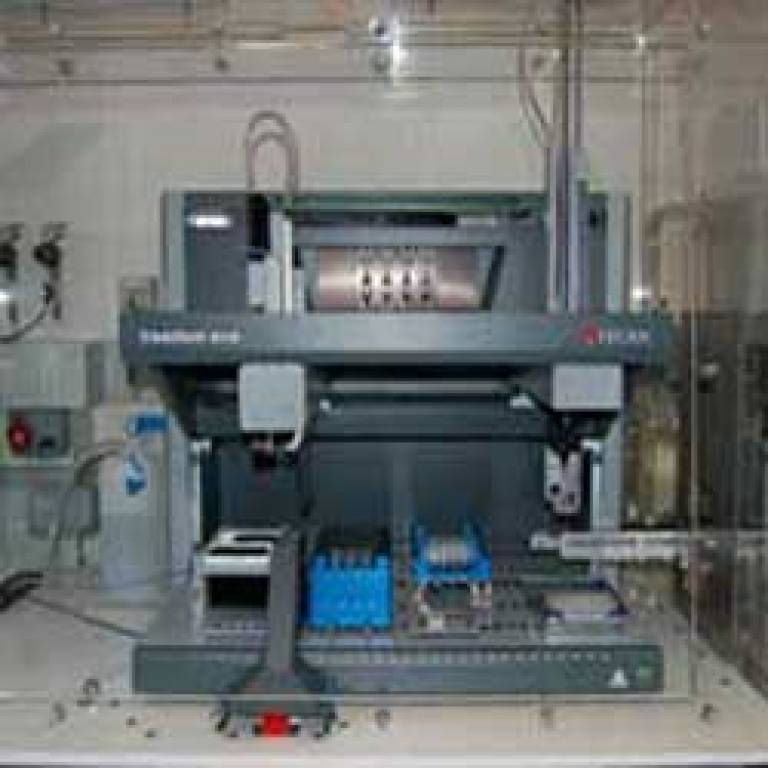Major regenerative medicine funding
25 January 2007
The UCL Advanced Centre for Biochemical Engineering, Plasticell Ltd and the National Institute for Biological Standards and Control (NIBSC) have received £1.
 1 million in funding from the Department of Trade and Industry's Technology Programme in a major boost for stem cell research in the UK.
1 million in funding from the Department of Trade and Industry's Technology Programme in a major boost for stem cell research in the UK.
The funding is for a collaborative project to develop robotics in order to automate stem cell research. This new technology will greatly increase the number of experiments stem cell researchers can conduct simultaneously. Currently, a single scientist can only conduct a handful of experiments at one time. The aim of the project is to enable thousands of experiments to be conducted in parallel using far smaller quantities of materials (ultra-scale down).
London-based biotechnology company Plasticell Ltd is developing drugs to regenerate tissues of the body. By collaborating with the UCL Advanced Centre for Biochemical Engineering, the firm will be able to automate its novel stem cell platform technology, CombiCult™. The consortium also includes the NIBSC which will provide advanced imaging methods.
The robotic equipment to be utilised in the project will enable researchers to test the effects of thousands of different factors and combinations of factors - such as growth, nutrients, hormones, or physical conditions - on how stem cells differentiate, or how they give rise to tissue cells like lung, heart, brain cells which can be used clinically. Plasticell calls this technology Combinatorial Cell Culture™.
Minister for Science and Innovation, Malcolm Wicks, said: "The UK is an acknowledged leader in the field of stem cell research and we want to ensure that the UK remains at the forefront. That's why we're supporting the Plasticell consortium on this project, which provides a great opportunity to harness the UK's world-class expertise and use it to boost our economy and, potentially, our health. Stem cell research has tremendous potential to tackle some of the most devastating diseases. It could benefit patients with conditions such as Parkinson's disease, juvenile diabetes and heart disease."
Plasticell will automate its research product, CombiCult™ using uniquely configured but industry-standard robotic equipment housed in aseptic biosafety enclosures where tissue culture can take place. This will increase productivity by enabling experiments to run 24/7 in a contaminant-free environment. In addition, Plasticell will license the technique and allow the wider research community to benefit from this important technology.
Dr Yen Choo, Plasticell Chief Executive, said: "At the moment, experiments are done on a trial and error basis and since cell culture work is cumbersome, a scientist can only handle a few experiments at any one time. However, with our technology a scientist could carry out 250,000 experiments in parallel in a couple of weeks. To do this many stem cell differentiation experiments in the conventional way would take that scientist a few lifetimes! I am very pleased our consortium has secured this highly competitive funding from the DTI, which allows Plasticell to progress Combinatorial Cell Culture™ in collaboration with world class partners at UCL and NIBSC."
The UCL Regenerative Medicine Bioprocessing Group within the Advanced Centre for Biochemical Engineering has world-class expertise in the translation and scale-up of stem cell and regenerative medicine therapies. It has 20 researchers with translational interests across the spectrum of regenerative medicine including stem cell (adult and embryonic) and somatic cell therapy through to tissue engineering.
The groups projects span every aspect including human embryonic stem cell line derivation through to clinical trials. The group has research collaborations with a number of academic groups, commercial organisations and government bodies.
Dr Chris Mason (UCL Regenerative Medicine Bioprocessing Unit) added: "We are extremely proud to be awarded the DTI Technology Programme funding. It will allow us to further expand our resaerch in the field of translating basic stem cell biology into routine clinical practice."
Image: The robotic facilities at the UCL Advanced Centre for Biochemical Engineering
 Close
Close

